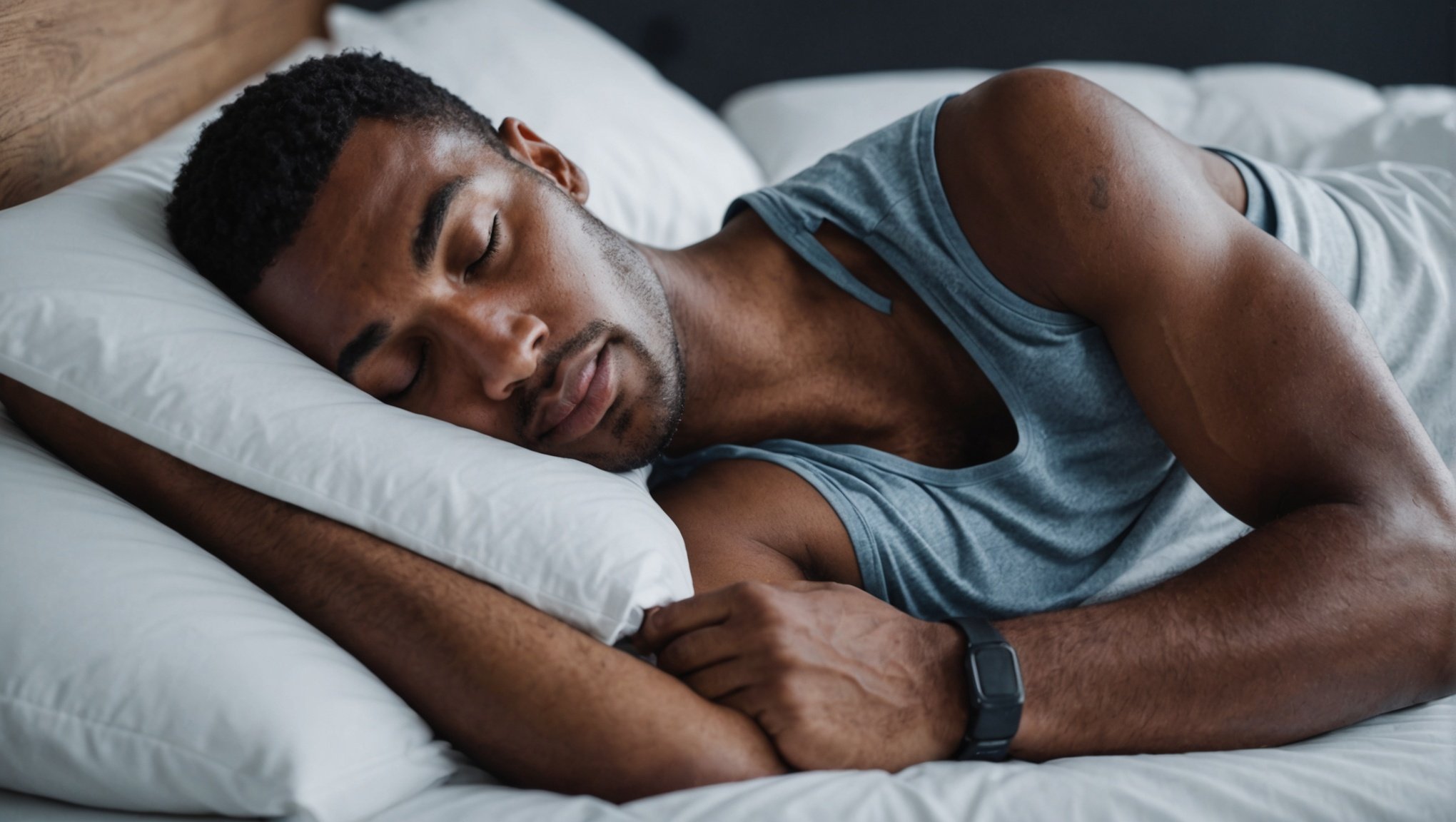Unlocking Peak Performance: Essential Sleep Hygiene Tips for UK Athletes to Enhance Recovery
The Critical Role of Sleep in Athletic Performance
For athletes, sleep is more than just a necessity; it is a crucial component of their training regimen. Sleep plays a vital role in physical recovery, mental health, and overall athletic performance. A study published on PubMed highlighted that athletes who increased their sleep to ten hours per night experienced significant improvements in their performance, mood, and alertness[1].
Sleep is the body’s time to repair and regenerate muscles, and the mind’s opportunity to consolidate learning and memory. Without adequate sleep, athletes can suffer from fatigue, reduced alertness, and diminished cognitive function. For UK athletes, understanding the importance of sleep and implementing good sleep hygiene practices can be the difference between mediocre and peak performance.
Also to discover : Boosting Scoring Efficiency: Tactical Strategies for UK Handball Teams
How Much Sleep Do Athletes Need?
The amount of sleep athletes need can vary based on several factors, including training intensity, age, and overall health. However, most elite athletes aim for at least eight hours of sleep per night, with many targeting as much as ten hours.
| Hours of Sleep | Benefits |
|---|---|
| 7-8 hours | Basic recovery needs met; some improvement in performance and mood |
| 8-9 hours | Enhanced recovery, improved performance, better mood and alertness |
| 10 hours | Optimal recovery, significant improvements in performance, mood, and alertness |
A study on collegiate basketball players found that sleep extension led to improvements in specific measures of athletic performance, indicating that optimal sleep is beneficial for reaching peak athletic levels[4].
Also read : Enhancing Diversity and Inclusion in UK High School Sports Programs: Innovative Strategies for Empowerment
The Impact of Sleep on Physical Recovery
Sleep is essential for muscle recovery and overall physical health. During deep sleep, the body releases growth hormones that assist in muscle repair and recovery. Without adequate sleep, this recovery process can be hindered, leading to prolonged muscle soreness and delayed healing of injuries.
Key Hormones Involved in Sleep and Recovery
- Growth Hormone: Released during deep sleep, it aids in muscle repair and recovery.
- Leptin and Ghrelin: Hormones that regulate hunger and fullness, which are disrupted by sleep deprivation, leading to poor food choices and potential weight gain[3].
The Impact of Sleep on Mental Health
Sleep also plays a vital role in an athlete’s mental health. Chronic sleep deprivation can lead to mood disorders, increased stress, and even depression. For athletes who often experience high levels of stress and anxiety, adequate sleep can be an effective strategy to manage these mental health challenges.
Managing Stress and Anxiety Through Sleep
- Reduced Anxiety: A good night’s sleep can reduce anxiety levels and improve mood.
- Improved Mental Wellbeing: Sleep supports emotional healing and helps process intense emotions, acting as a form of emotional therapy[1][3].
Sleep Strategies for Athletes
Implementing good sleep hygiene practices is crucial for maximizing sleep quality and duration. Here are some actionable tips for UK athletes:
Establish a Regular Sleep Schedule
Aim to go to bed and wake up at the same time every day, even on rest days. This helps regulate the body’s internal clock, promoting better sleep.
Create a Restful Environment
Ensure the sleep environment is dark, quiet, and cool. Consider using eye shades, ear plugs, or white noise machines if needed. A cool bedroom temperature, around 18-18.5 degrees Celsius or 65-68 degrees Fahrenheit, aids in falling and staying asleep[3].
Avoid Stimulants
Avoid caffeine and nicotine, particularly in the hours leading up to bedtime. These substances can interfere with the body’s ability to fall asleep and reduce sleep quality.
Limit Screen Time Before Bed
The blue light emitted by screens can interfere with the body’s production of melatonin, a hormone that regulates sleep. Engage in relaxing activities like reading or taking a warm bath instead[1].
Consider a Pre-Sleep Routine
Relaxing activities, such as meditation or listening to podcasts, can signal the body that it’s time to sleep. Getting out of bed after 30 minutes of being awake and engaging in these activities can help reestablish the association that the bed is a place for sleep[3].
Practical Tips for Improving Sleep Quality
Here are some additional practical tips to enhance sleep quality:
- Maintain Regularity: Go to bed and wake up at the same time every day.
- Dim the Lights: Create a dark environment before bed to signal to the brain that it’s time for sleep.
- Cool Down: Keep the bedroom temperature cool to aid in falling and staying asleep.
- Avoid Alcohol: Alcohol can negatively impact sleep quality by fragmenting sleep and blocking REM sleep[3].
The Consequences of Poor Sleep
Sleep deprivation can have severe consequences on athletic performance and overall health.
Reduced Reaction Times and Impaired Judgement
For athletes like boxers, reduced reaction times can affect their ability to dodge punches, while impaired judgement can lead to poor tactical decisions during a bout[1].
Increased Risk of Injuries
A higher risk of injuries can lead to a longer recovery time, affecting the athlete’s training schedule and performance in future bouts.
Weight Management Issues
Sleep deprivation disrupts hunger hormones, leading to increased cravings for unhealthy foods and potential weight gain. This can further impact athletic performance and overall health[3].
Real-Life Examples and Anecdotes
Elite athletes often emphasize the importance of sleep in their training regimens. For example, Eliud Kipchoge, the fastest marathon runner of all time, stresses the importance of both physical and mental preparation, including adequate sleep, for peak performance.
Education and Science Behind Sleep
Understanding the science behind sleep can help athletes make informed decisions about their sleep hygiene. Dr. Matthew Walker, a leading sleep expert, explains how sleep impacts physical and mental health, highlighting its critical role in recovery and performance.
For UK athletes aiming to enhance their recovery and achieve peak performance, prioritizing sleep is paramount. By understanding the critical role of sleep in physical recovery, mental health, and athletic performance, athletes can implement effective sleep hygiene strategies. Here is a summary of the key points:
- Aim for 8-10 hours of sleep per night to meet recovery needs and enhance performance.
- Establish a regular sleep schedule to regulate the body’s internal clock.
- Create a restful environment that is dark, quiet, and cool.
- Avoid stimulants and screen time before bed to improve sleep quality.
- Consider a pre-sleep routine to signal the body that it’s time to sleep.
By following these tips and understanding the importance of sleep, UK athletes can optimize their recovery, improve their athletic performance, and maintain overall health and wellbeing. As Dr. Matthew Walker emphasizes, “Sleep is not just a passive state; it is an active process that is essential for our physical and mental health”[3].













